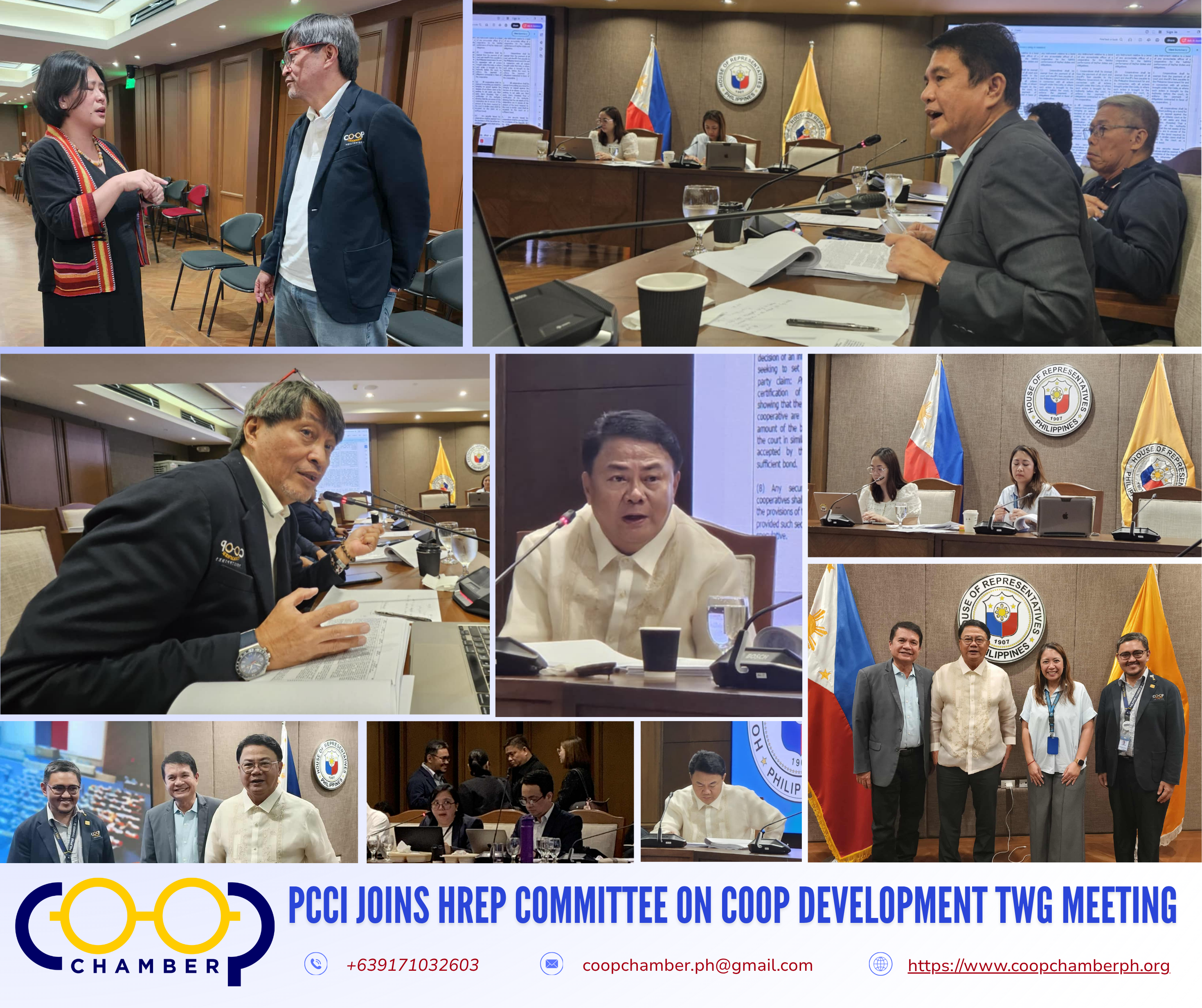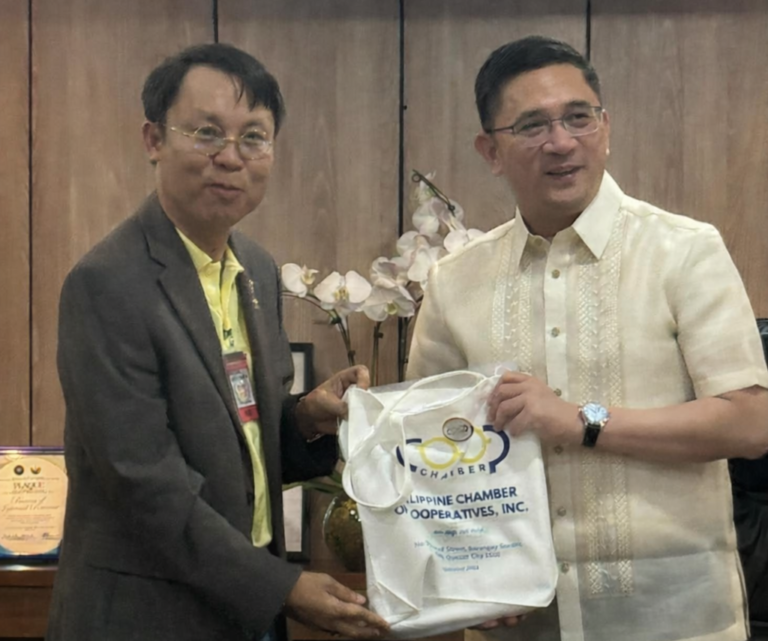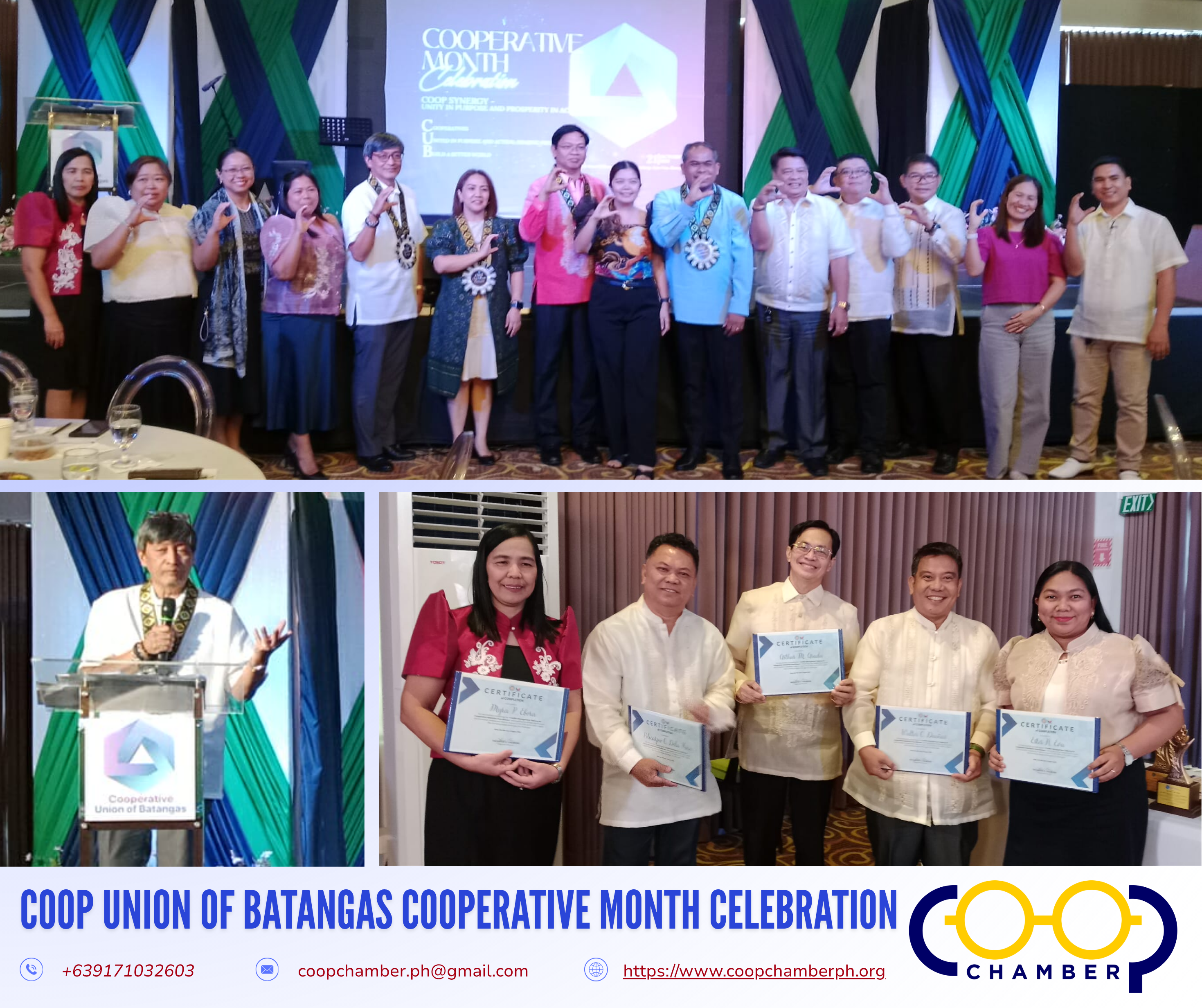Cooperative leaders, including representatives of the Philippine Chamber of Cooperative, Inc. who sits as one of the regular TWG members, along with representatives from concerned government agencies, including the CDA, DA, DOF, BIR, SEC, IC, BSP, DBP, OTC, BLGF and NEA, joined the first Technical Working Group of the House Committee on Cooperatives Development on the revision of Republic Act No. 9520 or the Cooperative Code of 2008 as chaired by Committee Secretary Atty. Sheryl Lagrosas, which was convened last October 22, 2025.
One of the authors of the proposed revisions and Vice Chairperson of the House Committee on Coop Development, AGAP Party List Rep. Nicanor Briones was also present during the meeting.
Here are the highlights of the TWG Meeting as documented by Secretary General Edwin Bustillos:
Atty. Sheryl Christine Lagrosas opened the meeting by recognizing the members of the TWG. She stated that they will be addressing the various versions of the proposed revisions, including House Bill 4540 from the AGAP Party List. Atty. Lagrosas emphasized that the TWG had to complete its committee report before November 10, as the Senate has already released its committee report, which is set for a second reading. She urged the TWG to focus on the contentious issues that must be finalized by November 6, which would also the last TWG meeting prior to the approval of the Committee Report for consideration by the House Committee on Cooperatives Development.
Among the specific provisions and contentious issues discussed, majority of which were raised by the Coop Chamber included:
- Section 3: retitling of General Concepts to Cooperatives, Values and Principles – no objection.
- Section 3: removed the limited compensation on the definition of Principle no. 3 on Member Economic Participation – no objection
- Section 4 dd: Definition of Reserve Fund – NATCCO Network and the Department of Finance (DOF) opposed using the reserved fund for operational and investment purposes. However, Coop Chamber and SIDC representative and former congressman Rico Geron argued that the reserved fund can still be utilized for operations, even if the cooperative is not experiencing losses or economic downturns, particularly for agricultural cooperatives, instead of keeping the money in a bank with minimal interest, cooperatives should use these funds to support their operations. Nevertheless, the reserved fund remains intact but will be subject to the recording. The TWG Chair noted that they would come out with a new definition of the reserved fund based on the inputs it gathered for presentation on the November 6 TWG meeting (for further discussion)
- Section 4 ff: definition of Secondary Cooperatives – no objection.
- Section 16: to include the validity of COC for 5 years – no objection.
- Section 23 5 (iv): On farmers’ cooperative to remove agrarian reform beneficiaries – this will again be tackled as to the question of its composition (majority of whom are not agrarian reform beneficiaries)
- Section 23 (6): Types and Categories of Cooperatives – DOF questioned the Public Utilities cluster on the inclusion of some types of cooperatives, as they are serving the public and not only the coop members. Representatives from OTC and Coop Chamber opposed the deletion of these types of cooperatives in the Code, as many coop members will be displaced, affecting the cooperatives as a whole. TWG Chair, Atty. Lagrosas, explained that public utilities, as defined, are clustered accordingly, and even if they are serving non-members, the taxability or non-taxability of these cooperatives is governed by the tax treatment provision of the Code. DOF posed that they would submit their position paper after conferring with their principals. The Coop Chamber and the ComSec explained that the said provisions were already tackled in the 19th Congress, and there was no objection from the DOF on this matter.
- Section 24: Apex of Cooperatives – CDA will come out with a revised text on the definition of Apex of Coop. ComSec Lagrosas asserted that it should not be entirely different from the current text, to which CDA said that it would just clarify the text.
- Section 30 of HB4540: inclusion of Renewable Energy as one of the special types of Federations – no objection.
- Section 30: Cooperative Unions – the proposal for a Cooperative Union to automatically act as a liquidator was questioned by the Coop Chamber. CDA would provide further qualifications for liquidators under this context.
- Section 34: Government officers and employees – CDA questioned the provision on cooperatives donating funds for electoral campaigns, but this would be up for further discussion.
- Section 44: Voting System – the Coop Chamber and SIDC asserted the one coop-one member vote for secondary cooperatives, as discussed in the legal ruling of the ICA, and the core of the second cooperative principle on member democratic control. The Coop Chamber further explained that share voting is a practice of a corporation, and the cooperative will be losing its identity if this will be adopted. PCC and NUC proposed that, at the secondary level, proportional voting should be allowed, especially for capital-intensive cooperatives like coop banks. The positions of Rep. Espares and Rep. Briones are for one coop-one vote. However, the CDA sided with PCC’s proposal that federations should be allowed in their Articles of Cooperation and bylaws, whether for incentive voting or proportional voting. CDA also suggested inviting the ICA to clarify its ruling. Due to time constraints, the COMSEC requests the CDA to draft its position for further discussion in the next TWG Meeting. It shall also be noted that NUC Legal Counsel, Atty. Laarni Mallari during this discussion read the position paper of the Philippine Cooperative Center.
- Section 66: on the written notification to the employer instead of a request for deduction – this was still subject for discussion
- Section 68: Tax Treatment to include patronage refund – no objection.
- Section 69 (a): on Tax and Other Exemptions – DOF opposed the proposed tax cap of 100 million for cooperatives and instead suggested a 50 million tax cap for agricultural cooperatives only. CDA and attending cooperatives opposed this proposal providing related justifications. ComSec Lagrosas reminded the DOF that the Senate version already sets the limit at 100 million. This matter will be discussed further during the next TWG Meeting as the DOF plans to confer this first with its principals. Cong Rico Geron emphasized that the contributions of cooperatives, especially regarding the Cooperative Education and Training Fund (CETF) and the Cooperative Development Fund (CDF), are effectively considered taxes that directly benefit their members and the communities in which they operate. The Coop Chamber also pointed out that cooperatives are well-positioned to implement poverty alleviation programs, especially given the issues surrounding public funds and corruption.
- Section 69 2. (iii): on the non-imposition of VAT in modern vehicles – The OTC and the Coop Chamber supported this provision citing further that in the previous TRAIN Law, the VAT for pick-up type vehicles was removed on the condition that this would be used for agri-business. The same shall be afforded to the Modernized Vehicles. DOF opposed this proposal and subject this matter for further discussion.
- Section 70: Issuance of CTE that individual TIN is no longer required – no objection.
- Section 91: Audit of cooperatives – no need for CPA to certify the FS of micro coops – no objection.
- Section 97: Net Surplus Allocation –
- a) Reserve Fund – DOF and the NATCCONetwork opposed the use of the reserved fund for operational and investment purposes. However, as earlier argued, SIDC and Coop Chamber cited that it could still be utilized. The ComSec would prepare a revised text to ensure a balanced presentation of this section for further discussion.
- b) CETF – The Coop Chamber and SIDC asserted that primary cooperatives should decide on the allocation of the CETF for multiple affiliations, and further elaborated its position paper on this issue. The CDA, NUC, and the PCC batted for the automatic allocation of 20% to cooperative unions, to which the Coop Chamber stated that this is violative of the open and voluntary membership and autonomy and independence principles of cooperativism.
- c) CDF – Use of CDF for insuring crops and other agri-agra products of cooperatives – no objection.
- Section 98: on the Agricultural Cooperatives’ representation of cooperatives as Private Sector in the ACPC, PCIC, LBP, DBP, and PCA – DA mentioned that in the National Dairy Board, cooperatives are represented. The Coop Chamber asked the DA for the position of their principals on this matter, subject to further discussion
- Section 115: Cooperatives acquiring private agricultural land shall not be subject to the 5-hectare limit if to be used for agricultural purposes – no objection. However, there must be a provision stating the period by which this lot should not be sold. As to credit and savings cooperatives acquiring more than 5 hectares of land, this still needs to be further discussed.
- Section 145: Insurance Cooperatives – the IC cited that the pre-need should not be included in the insurance cooperatives. The scope of services of insurance cooperatives was also question, to which the Coop Chamber explained that insurance cooperatives could cater to both members and non-members, and in terms of regulation, the Insurance Code should apply. This was no longer objected, but pre-need insurance would still be subject to further discussion.
- Section 154: Registration, regulation and supervision of transport service cooperatives – OTC and the Coop Chamber explained that the PTMP must proceed, especially in providing more subsidies to the sector.
- Section 156: On the oversight committee – the Coop Chamber asserted that the inclusion of NAC and the RCOs in the oversight committee should not be allowed as these organizations have no juridical personalities. This was not objected.
- Section 160: On Electric Cooperatives – The NEA, CDA, and PHILFECO, through the intercession of the Coop Chamber, agreed to meet to discuss the contentious issues on this chapter of electric cooperatives. This is targeted to be scheduled before the next TWG Meeting.
- Section 179: On allowing the use of the term “cooperatives” for juridical entities that have interests, affiliations, collaborations, or partnerships with a cooperative or the cooperative sector – the Securities and Exchange Commission (SEC), as a regulatory body of corporations, including non-profit organizations, supported these versions citing that they have been following specific rules when registering non-stock, non-profit organizations or corporations that wish to use the term “cooperative,” ensuring that they would not be violating the Cooperative Code. They also shared that based on their database, there were 215 organizations registered with the SEC that use the word “cooperative” alongside “Inc.”. The Cooperative Chamber welcomed this SEC’s position, explaining that the section was thoroughly deliberated in the Senate, and that the versions of Rep. Espares and Rep. Briones were consistent with the Senate Committee report. CDA recognized the exemplary efforts of the Coop Chamber in advancing cooperativism in the country, but they also noted that around 5,000 cooperatives oppose this section. Additionally, the NUC also expressed opposition to the SEC and Coop Chamber’s position. The ComSec clarified that if the organizations using the term “cooperative” are not benefiting from tax exemptions and other privileges, as explained by SIDC Representative, former Cong. Rico Geron, then there should be no issue with the use of the term. On the issue of scammers, this should be addressed, and perpetrators should be held accountable through the regulatory powers of the SEC and the CDA in this regard. Further discussion is encouraged on this matter.
There being no contentious matter raised, the group agreed to meet again on November 6, 2025.




